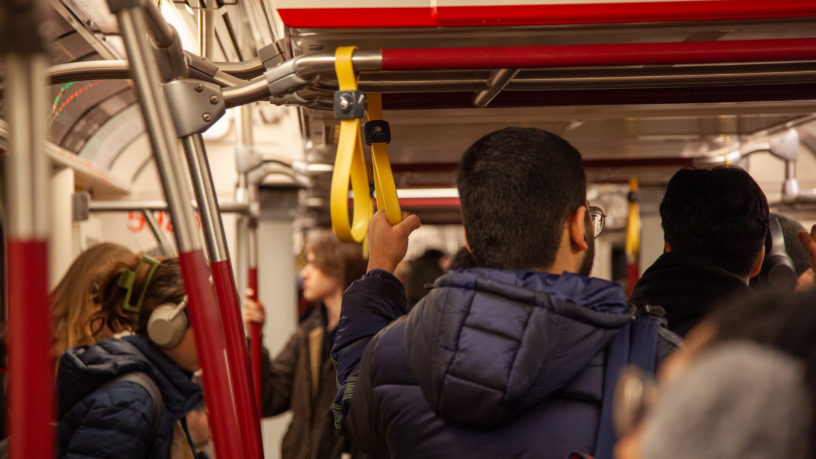By Gabriela Silva Ponte
Toronto Metropolitan University (TMU) students say they are excited for Ontario’s newly implemented One Fare Program.
On Feb. 5, Premier Doug Ford’s Progressive Conservative government announced it would be implementing and funding the program, according to an Ontario news release.
One Fare came into effect on Feb. 26, according to a Metrolinx program page.
In a Toronto Transit Commission (TTC) update, the commission said this will apply to customers using PRESTO cards, debit or credit cards on TTC, Brampton Transit, Durham Region Transit, Mississauga’s MiWay and York Region Transit.
Through the program, commuters will be reimbursed for their single-ride TTC fare when transferring to and from GO Transit. Those using public transportation will also be able to use their free two-hour TTC transfer to and from other transit agencies across the Greater Toronto Area (GTA).
“We are optimistic the program will boost transit use across the GTA and lead to more TTC customers,” the senior communications advisor at TTC, Stuart Green, told The Eyeopener over email.
And the government is sure this will be the case. Ontario’s Associate Minister of Transportation Vijay Thanigasalam told The Eye this program is expected to increase TTC ridership to nearly 8 million new riders.
“As a system, we are ready, but we are enabling other transit agencies to accommodate the new changes. So that once we work together, all levels of government, we can make these things happen,” Thanigasalam said in regards to whether or not the TTC is ready for this increase in ridership.
He said this will reduce the province’s reliance on motor vehicles.
“What that means is more cars off the road, less congestion. So, our government is providing choice. [Students] have the choice to take public transit or their car,” he said. “This is a huge milestone that TTC is on board [with].”
Thanigasalam said this move is an investment in the future of transportation and infrastructure, which is why $70 billion will be put towards this.
“What we’re trying to do is we are trying to build the infrastructure, we are trying to enable all the municipal leaders and all the transit agencies like TTC, GO [Transit]…for them to come together. We are connecting them with technology, with one system and also connecting them in the legal perspective as well,” he said.
Jaymin Pandya, a second-year aerospace engineering student, said the extra money he won’t be spending on his commute will be going toward his savings or a treat for himself.
Pandya said his commute usually consists of his local bus service in Brampton, the GO train and the TTC. Prior to the One Fare program, this would have cost just over $18 in each direction.
“It’s nice to be able to take the subway without having to think about the cost and the additional money,” said Pandya. “It’s a nice, free transportation method when I’ve already been paying so much every day.”
Emily Jose, a second-year criminology student, said she commutes from Brampton using the GO train and TTC. She said she takes transit so that she doesn’t have to pay for rent in Toronto.
“I’m worrying less about how much money I’m spending on my commute, coming to campus every day is quite expensive,” she said.
Ahmed Siddiqui, a fourth-year graphic communications management student, said he’s most excited about the money he’ll be saving but wished the change had been implemented sooner.
Siddiqui said he takes the GO train from Aldershot in Burlington to Union Station and then the subway to campus, four times a week. According to GO Transit’s trip planner, this commute can total $16.50 each way.
“We’ve been in a recession so I feel like everything has been so expensive lately,” he said. “I think even a little change like this can help the average commuter a lot.”
With an affordability crisis currently at play in Canada’s government, Thanigasalam says he is hoping this will certainly help those students debating skipping a class or getting a part-time job.
“Right now, affordability is the number one issue. The cost of living is going up, the grocery prices are going up,” he said.
Thanigasalam said he understands the struggle of having to pay double or triple fare.
“Right [after] my graduation from university, my first job was in Mississauga. I [was] living in Scarborough. So I was commuting from Scarborough to Mississauga everyday, paid double fare, so I understand what people are going through right now,” he said.
Ontario’s news release stated the program could save riders commuting five times a week up to $1,600 per year.
Ted Rogers School of Management professor Richard Deklerk said in an interview with The Eye that this will be beneficial for students commuting to TMU.
“I think it is going to help students a lot because they do need a lot of help,” said Deklerk. “Even though you are living at home and mom and dad are paying the rent [and] you are getting free meals, most of us need a part-time job [to get by in University].”
He also said he is looking forward to this program for his own sake. Deklerk commutes from Markham and uses GO Transit and the TTC.
“I used to get a bit of a discount [on transportation],” said Deklerk. “I think it was $1.50 or $2. Now they are basically saying, ‘Whenever you are on the GO train, tap on again on the subway, and it will be free.’ I’m looking forward to that.”
With files from Dexter LeRuez.












Leave a Reply